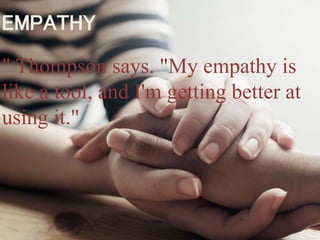
Empathy
- 1. EMPATHY " Thompson says. "My empathy is like a tool, and I'm getting better at using it."
- 2. EMPATHY EMPATHY IS THE ABILITY TO IDENTIFY WITH OR VICARIOUSLY EXPERIENCE ANOTHER PERSON’S SITUATION .EMPATHIZING IS BOTH AN INTELLECTUAL AND EMOTIONAL PROCESS THAT MAKES IT FAR EASIER TO UNDERSTAND AND HELP OTHERS SOLVE THEIR PROBLEMS. MOST SOCIAL WORKERS ARE EMPATHETIC BY NATURE: IN FACT, EMPATHY IS A MAJOR REASON PEOPLE ENTER THE PREFESSION.
- 3. WHAT IS EMPATHY? • The term “empathy” is used to describe a wide range of experiences. Emotion researchers generally define empathy as the ability to sense other people’s emotions, coupled with the ability to imagine what someone else might be thinking or feeling. • And we'd love to hear about the real examples of empathy in your life. Whether it's a neighbor who brings dinner over once a week because you're too tired to cook or a family member who volunteers to babysit your children when you have fatigue, empathy helps those who can't always help themselves.
- 4. TYPES OF EMPATHY TWO TYPES OF EMPATHY: Emotional empathy • refers to the sensations and feelings we get in response to others’ emotions; this can include mirroring what that person is feeling, or just feeling stressed when we detect another’s fear or anxiety. Cognitive empathy, • sometimes called “perspective taking,” refers to our ability to identify and understand other people’s emotions. Studies suggest that people with autism spectrum disorders have a hard time empathizing.
- 5. Elements of Empathy Daniel Goleman identified five key elements of empathy. Understanding Others Developing Others Having a Service Orientation Leveraging Diversity Political Awareness
- 6. Understanding Others This is perhaps what most people understand by ‘empathy’: in Goleman’s words, “sensing others’ feelings and perspectives, and taking an active interest in their concerns” Developing Others Developing others means acting on their needs and concerns, and helping them to develop to their full potential. Reward and praise people for their strengths and accomplishments, and provide constructive feedback designed to focus on how to improve. Having a Service Orientation Primarily aimed at work situations, having a service orientation means putting the needs of customers first and looking for ways to improve their satisfaction and loyalty. People who have this approach will ‘go the extra mile’ for customers. They will genuinely understand customers’ needs, and go out of their way to help meet them. Leveraging Diversity Leveraging diversity means being able to create and develop opportunities through different kinds of people, recognising and celebrating that we all bring something different to the table. Political Awareness Many people view ‘political’ skills as manipulative, but in its best sense, ‘political’ means sensing and responding to a group’s emotional undercurrents and power relationships.
- 7. EMPATHY AND SOCIAL WORK • Empathy is important for the survival and maintenance of society by preventing aggression against others and establishing healthy communication among members It also forms the basis of the feeling of interest, warmth and closeness to those in difficult situations. Empathy related helping behavior (prosocial behaviors) involves helping others in a difficult situation Hence empathy is co-related to Social work.
- 8. IMPLICATIONS TO SOCIAL CASE WORK PRACTICE • The use of empathy is considered an essential part of the professional encounter and a standard in providing ethical care. ... In the Social Work dictionary, empathy is defined as “the act of perceiving, understanding, experiencing and responding to the emotional state and ideas of another person” • Clients experiencing empathy through treatment have improved outcomes. Empathic social work practitioners are more effective and can balance their roles better. Social work practitioners can and should learn about emerging research on empathy and use that information to better serve their client populations.
- 9. CONCLUSION “Being empathic also helps you view the world in a more balanced and objective way” When people understand or relate themselves with the thoughts, feelings, emotions, and situations they can provide more beneficial support through understanding. THEREFORE AS A SOCIAL WORKER EMPATHY PLAYS IMPORTANT ROLE, TO HELP PEOPLE TO HELP THEMSELVES
- 10. REFERENCE D'Cruz, H. & Jones, M. (2004) Social Work Research: Ethical and Political Context. London: SAGE Publications Ltd https://greatergood.berkeley.edu/topic/empathy/definition
